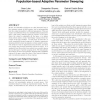Free Online Productivity Tools
i2Speak
i2Symbol
i2OCR
iTex2Img
iWeb2Print
iWeb2Shot
i2Type
iPdf2Split
iPdf2Merge
i2Bopomofo
i2Arabic
i2Style
i2Image
i2PDF
iLatex2Rtf
Sci2ools
GECCO
2007
Springer
2007
Springer
Finding interesting things
Model- and simulation-designers are often interested not in the optimum output of their system, but in understanding how the output is sensitive to different parameters. This can require an inefficient sweep of a multidimensional parameter space, with many samples tested in regions of the space where the output is essentially all the same, or a sparse sweep which misses crucial “interesting” regions where the output is strongly sensitive. In this paper we introduce a novel population-oriented approach to adaptive parameter sweeping which focuses its samples on these sensitive areas. The method is easy to implement and model-free, and does not require any previous knowledge about the space. In a weakened form the method can operate in non-metric spaces such as the space of genetic program trees. We demonstrate the method on three test problems, showing that it identifies regions of the space where the slope of the output is highest, and concentrates samples on those regions. Cate...
Related Content
| Added | 07 Jun 2010 |
| Updated | 07 Jun 2010 |
| Type | Conference |
| Year | 2007 |
| Where | GECCO |
| Authors | Sean Luke, Deepankar Sharma, Gabriel Catalin Balan |
Comments (0)

